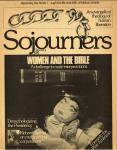Moments after the Rev. William Wendt was sentenced by the Bishop of Washington for ecclesiastical disobedience (having invited the Rev. Alison Cheek, one of the women who has been ordained to the Episcopal priesthood, to preside at the Eucharist), Cheek remarked publicly that Wendt had been rendered a scapegoat.
“His conscience,” she declared, is blamed for the default, for the cowardice, for the vanity of others. ... He is sentenced while 46 other male priests in the 12 dioceses who might have been similarly charged are ignored ... He is punished because I am a priest. Instead of sentencing Bill Wendt ... Bishop Creighton (should) ... have caused charges to be brought against me …”
She spoke the truth. Wendt, along with the Rev. Peter Beebe, similarly put to trial in Ohio, bears the burdens of others, suffers as a surrogate for others, and intercedes for others--including, the Bishop of Washington--in his conviction and punishment.
Since July of 1974, when the first women were ordained in Philadelphia, no charges have been lodged against any of the principals participant in that event--neither any of the women ordained, nor any of the ordaining bishops. This omission persists despite the redundant public admissions of the principals that there was canonical irregularity--though not sacramental invalidity--in the ordinations. The refusal of the church management to allow charges against the principals flouted the law of the Episcopal Church and made the proceedings against Wendt a legal anomaly from the outset because an accessory was prosecuted before any offense by any principal had been established.
So, at the trial, at which most of the women priests were present in person, Alison Cheek and her peers endured the penultimate put-down of beholding someone else--a male priest, at that--held accountable and put in jeopardy instead of themselves.
If that was the grandiloquent instance of treating these women as non-persons or as dependents, so far as the Episcopal Church is concerned, it is hardly the only one. Prior to the Philadelphia ordinations, the Episcopalians had indulged a rather leisurely and hypothetical debate as to whether or not women could be ordained to the priesthood. Whatever other significance may be assigned to it, the actual ordination of some women to the priesthood obviated that debate. The historical situation changed in a significant way, there was no longer the luxury of a theoretical policy discussion about ordaining women, now what had to be confronted was these persons, these women who claim to be priests.
That gave the management of the Episcopal Church two options -- 1) to recognize the priesthood of those who were ordained or 2) to initiate proceedings which might lead to their depositions. Alison Cheek and her colleagues took the risk of those options and thought, if the second had been pursued, there might have been harsh results, at the least that could be said to be fair enough in the circumstances. Instead, apprehensive about adverse secular publicity, the putative leadership of the church undertook elaborate effort to ensure that none of the women, nor the bishops who ordained them, would be charged. Moreover, in the whole ensuing controversy, especially in the House of Bishops, the refusal to acknowledge the existence, and thus the personhood, of the women priests has been steadfast. No one of them has yet been ecclesiastically consulted about any substantive aspect of the very situation which their decisions and conduct has occasioned. Even when the House of Bishops considered, at its last convening, whether the Philadelphia priests could be regularized, it had to be admitted that no one had raised that subject with any of the women priests. That, perchance, explains why the discussion of the matter in the House of Bishops had such an emphatically punitive tone. The bishops may, eventually, confront the women priests, but only if the women acquiesce to their public humiliation.
If that serves to reassert the vanity of episcopal paternalism, it does not bespeak reconciliation. It seems elementary to me that there can be no reconciliation until that which was omitted in the first place is supplied, and that is the recognition of these women as human beings, responsible and accountable in their own right. I have no doubt that if they are recognized as persons, they will be duly recognized in their vocations as priests.
Meanwhile, Wendt, as Cheek mentioned, is a scapegoat. When I first agreed to serve Wendt as counsel, I said to him that our concern, in the trial, must not be to win, but must be to be faithful to the gospel. As I comprehend the gospel, when it is said of Wendt that he is a scapegoat, his faithfulness is being affirmed.
When this article appeared, William Stringfellow was an attorney, lay theologian, social critic, and author of An Ethic for Christians and Other Aliens in a Strange Land.

Got something to say about what you're reading? We value your feedback!
